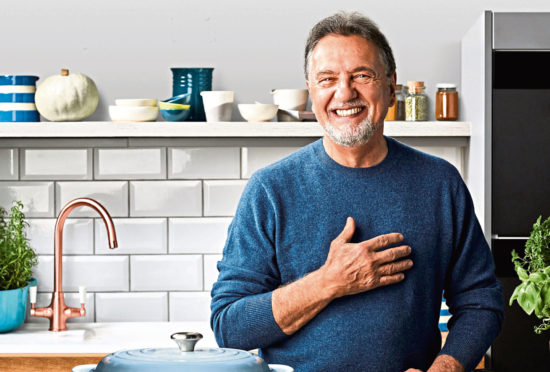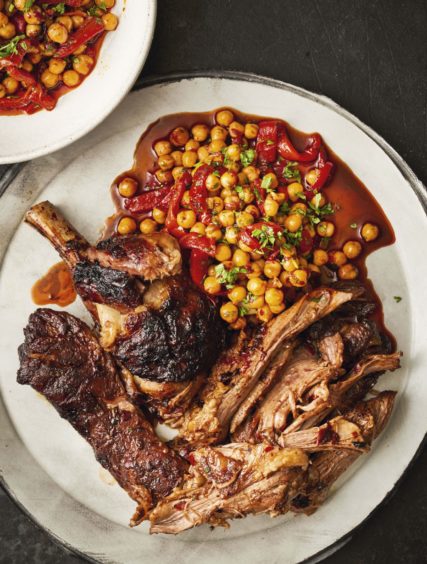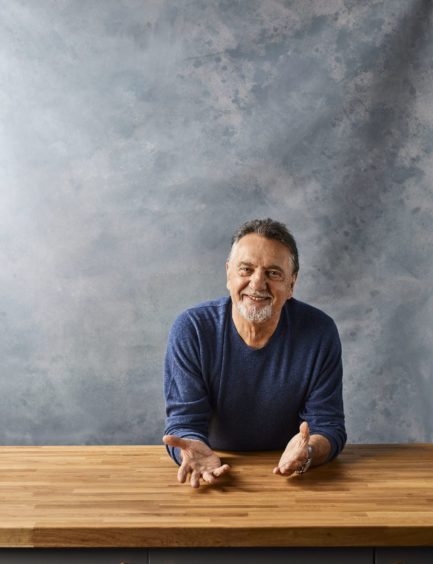
Raymond Blanc is in excellent spirits. Dining is back on the menu, meaning the chef’s Brasserie Blanc restaurants have reopened and the Blanc empire has “created some beautiful open marquees” complete, of course, with heaters.
Le Manoir aux Quat’Saisons, his two-Michelin starred Oxfordshire restaurant, is fully booked for the next six months.
It is cause for “a bit of joy in our team and of course a lot of laughter and celebration among our guests”, says Blanc. But he is cautious, too. “There’s some reserve because you don’t know what’s going to happen next.
“We all pray on the wing, so to speak. We pray we’re going to learn to live with Covid and it’s not going to destroy people’s lives nor businesses anymore.”
If you’re in the restaurant game, the pandemic has been particularly brutal, and for Blanc, 71, it took a directly personal toll too. Following a cough and a positive Covid test result, he found himself admitted to the Covid high-dependency unit at John Radcliffe Hospital, Oxford, and was there for a month.
“The first two weeks I was completely out, it was extraordinary,” he recalls. “You didn’t know which way it would go.”
Having spent much of the pandemic up until that point “cooking my heart out”, you’d think the shift to hospital food and being unable to fix his own dinners would have added to an already scary and difficult situation, but Blanc is pragmatic.
“It was very severe Covid and that means you didn’t think of it,” he says. “Hospital food reminded me maybe that I missed my own cooking, but Natalia (Traxel, his long-time partner) would always bring me some lovely food” – but this was only after three weeks, when Blanc was more “with it” and able to appreciate eating properly again.
He is not remotely scathing about the hospital fare he encountered though. It is “not renowned and I can understand it, there is so little budget,” he notes, but as a patient, “you’re not looking for a three-star Michelin meal, you just eat whatever is in front of you. And I must say, some of it was very, very good, especially the desserts.
“Many chefs, many establishments, have tried to change the food in hospitals, but there’s always the issue of cost,” he continues. “They do their best with what they have. I’m amazed actually, the food always came piping hot. I was very grateful.”
However, when he “started to regain a bit of colour on my cheeks”, he did begin to rather miss a nice glass of wine. “It took me two-and-a-half months before I could drink any wine, because I couldn’t enjoy it! It was like vinegar.” This was less to do with Covid, he says (“I never lost my taste, that’s one of the most remarkable things”), and more due to “all sorts of medicines they give you; your tongue is like a cheese grater.”
The flavour of his new book, Simply Raymond, is very much tinged by the experiences of pandemic life – be it how many of us have become increasingly connected with what we’re eating, where it’s come from and who grew it, or just the fact we’ve done so much more cooking than before.
“This little book is really all about the joyful experience of cooking – it’s my cooking, from my home to yours,” explains Blanc. “It is full of unfussy recipes. They are driven by simplicity, by seasonality, by real values. And you don’t need expensive gadgets, no sous vide machines or anything like that. It’s enjoyable.”
It is also imbued with the love he has for his late mother, Maman, and his respect for French author and scientist Edouard de Pomiane, whose book, Cooking In 10 Minutes, was the blueprint for Simply Raymond. “He was a genius, in so much he understood that the world was changing,” says Blanc. “He had already noticed in his time that people didn’t take the time to eat properly.”
The need to be able to whip up dinner in 10 minutes became less important once we were all in lockdown though. Cooking became a source of relaxation, comfort and distraction. “It’s wonderful to see that small revolution,” says Blanc.
So rather than a place for swift recipes, Simply Raymond became a book that instead “demystifies cooking, it simplifies it. It makes it accessible. It gives you confidence.” And technique is key. “Once you can pan fry a steak, you can pan fry anything,” says Blanc. “This technique will give you thousands of recipes.”
Many of the practical and logistical aspects – from relying on water instead of stock, to the mantra “You shalt not waste” – come courtesy of his mother, who died in 2020 aged 97.
“I come from a working background, and we didn’t have very much money,” says Blanc, who grew up in the Franche-Comté region of France, and retains his thick, melodic French accent.
“We had a huge garden. My mum was a former farmer, so she really knew all about simple home cooking as she had to feed a family of seven every day.
“Maman would feed the rabbits and talk to them,” he says, a smile curving round his words. “Sunday was a big dilemma.” Because of course, family dinner on Sunday was a big deal, and rabbit was in the offing – braised with white wine and mustard.
“She would eat her rabbit, and at the same time she was smiling, she was crying,” remembers Blanc with a laugh. “She loved the taste of the rabbit.”
Simply Raymond he says is “my gift to her because her gift to me has been enormous in my life: a foundation and my values toward food, toward people.”
You can feel it on every page.
Slow-roasted shoulder of lamb recipe with harissa (Serves 4-6)

“When I was about 12, I was introduced to the food of Algeria,” recalls Raymond.
“I remember seeing whole lambs roasted on the spit and, as the meat was turned, it was also painted with the spicy juices.”
You’ll need:
- 1tbsp sea salt
- 1tbsp ground cumin
- 100g rose harissa
- 100ml extra-virgin olive oil
- 2.5kg new season’s shoulder of lamb
- 300ml water
For chickpea salad:
- 1 jar (230g) piquillo peppers
- 2 beldi preserved lemons
- Handful of curly or flat-leaf parsley
- 2 tins (400g) chickpeas
- Sea salt and black pepper
Method
Mix together the salt, cumin and harissa, and then add the extra-virgin olive oil. Place the lamb in a roasting tin. Lightly score the skin of the lamb and rub it all over with the salty harissa mixture. At this point, you can leave the lamb for an hour, allowing the harissa flavours to infuse, but this is not essential.
Preheat the oven to 180C/160C fan/gas 4
Roast the lamb for 20 minutes, and then reduce the temperature to 150C/130C fan/gas 2. Cover the lamb shoulder loosely with foil, and return it to the oven to roast for a further two hours. Now baste the lamb, add the water and return it to the oven for two hours, again loosely covered with foil.
While the lamb is roasting, chop the piquillo peppers, finely chop the preserved lemons (skin and pulp) and coarsely chop the parsley. Put them to one side; you will need them to finish the dish.
Remove the lamb from the oven. Spoon out most of the fat from the tin, leaving the roasting juices. To the warm roasting juices, add the chickpeas, peppers and lemon. Add the parsley too and season with the salt and pepper. Toss together and bring to the boil on the hob. Place the lamb shoulder on a platter with the chickpea salad.
Bring the lamb to the table and invite your guests to help themselves. The lamb will be tender enough to fall from the bone with a spoon, though it can be carved if you prefer.
Simply Raymond: Recipes From Home by Raymond Blanc is published by Headline Home, priced £25. Photos by Chris Terry

Enjoy the convenience of having The Sunday Post delivered as a digital ePaper straight to your smartphone, tablet or computer.
Subscribe for only £5.49 a month and enjoy all the benefits of the printed paper as a digital replica.
Subscribe © Press Association Images
© Press Association Images © Chris Terry/PA
© Chris Terry/PA